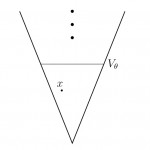 Set-theoretic arguments often make use of the fact that a particular property $\varphi$ is local, in the sense that instances of the property can be verified by checking certain facts in only a bounded part of the set-theoretic universe, such as inside some rank-initial segment $V_\theta$ or inside the collection $H_\kappa$ of all sets of hereditary size less than $\kappa$. It turns out that this concept is exactly equivalent to the property being $\Sigma_2$ expressible in the language of set theory.
Set-theoretic arguments often make use of the fact that a particular property $\varphi$ is local, in the sense that instances of the property can be verified by checking certain facts in only a bounded part of the set-theoretic universe, such as inside some rank-initial segment $V_\theta$ or inside the collection $H_\kappa$ of all sets of hereditary size less than $\kappa$. It turns out that this concept is exactly equivalent to the property being $\Sigma_2$ expressible in the language of set theory.
Theorem. For any assertion $\varphi$ in the language of set theory, the following are equivalent:
- $\varphi$ is ZFC-provably equivalent to a $\Sigma_2$ assertion.
- $\varphi$ is ZFC-provably equivalent to an assertion of the form “$\exists \theta\, V_\theta\models\psi$,” where $\psi$ is a statement of any complexity.
- $\varphi$ is ZFC-provably equivalent to an assertion of the form “$\exists \kappa\, H_\kappa\models\psi$,” where $\psi$ is a statement of any complexity.
Just to clarify, the $\Sigma_2$ assertions in set theory are those of the form $\exists x\,\forall y\,\varphi_0(x,y)$, where $\varphi_0$ has only bounded quantifiers. The set $V_\theta$ refers to the rank-initial segment of the set-theoretic universe, consisting of all sets of von Neumann rank less than $\theta$. The set $H_\kappa$ consists of all sets of hereditary size less than $\kappa$, that is, whose transitive closure has size less than $\kappa$.
Proof. ($3\to 2$) Since $H_\kappa$ is correctly computed inside $V_\theta$ for any $\theta>\kappa$, it follows that to assert that some $H_\kappa$ satisfies $\psi$ is the same as to assert that some $V_\theta$ thinks that there is some cardinal $\kappa$ such that $H_\kappa$ satisfies $\psi$.
($2\to 1$) The statement $\exists \theta\, V_\theta\models\psi$ is equivalent to the assertion $\exists\theta\,\exists x\,(x=V_\theta\wedge x\models\psi)$. The claim that $x\models\psi$ involves only bounded quantifiers, since the quantifiers of $\psi$ become bounded by $x$. The claim that $x=V_\theta$ is $\Pi_1$ in $x$ and $\theta$, since it is equivalent to saying that $x$ is transitive and the ordinals of $x$ are precisely $\theta$ and $x$ thinks every $V_\alpha$ exists, plus a certain minimal set theory (so far this is just $\Delta_0$, since all quantifiers are bounded), plus, finally, the assertion that $x$ contains every subset of each of its elements. So altogether, the assertion that some $V_\theta$ satisfies $\psi$ has complexity $\Sigma_2$ in the language of set theory.
($1\to 3$) This implication is a consequence of the following absoluteness lemma.
Lemma. (Levy) If $\kappa$ is any uncountable cardinal, then $H_\kappa\prec_{\Sigma_1} V$.
Proof. Suppose that $x\in H_\kappa$ and $V\models\exists y\,\psi(x,y)$, where $\psi$ has only bounded quantifiers. Fix some such witness $y$, which exists inside some $H_\gamma$ for perhaps much larger $\gamma$. By the Löwenheim-Skolem theorem, there is $X\prec H_\gamma$ with $\text{TC}(\{x\})\subset X$, $y\in X$ and $X$ of size less than $\kappa$. Let $\pi:X\cong M$ be the Mostowski collapse of $X$, so that $M$ is transitive, and since it has size less than $\kappa$, it follows that $M\subset H_\kappa$. Since the transitive closure of $\{x\}$ was contained in $X$, it follows that $\pi(x)=x$. Thus, since $X\models\psi(x,y)$ we conclude that $M\models \psi(x,\pi(y))$ and so hence $\pi(y)$ is a witness to $\psi(x,\cdot)$ inside $H_\kappa$, as desired. QED
Using the lemma, we now prove the remaining part of the theorem. Consider any $\Sigma_2$ assertion $\exists x\,\forall y\, \varphi_0(x,y)$, where $\varphi_0$ has only bounded quantifiers. This assertion is equivalent to $\exists\kappa\, H_\kappa\models\exists x\,\forall y\,\varphi_0(x,y)$, simply because if there is such a $\kappa$ with $H_\kappa$ having such an $x$, then by the lemma this $x$ works for all $y\in V$ since $H_\kappa\prec_{\Sigma_1}V$; and conversely, if there is an $x$ such that $\forall y\, \varphi_0(x,y)$, then this will remain true inside any $H_\kappa$ with $x\in H_\kappa$. QED
In light of the theorem, it makes sense to refer to the $\Sigma_2$ properties as the locally verifiable properties, or perhaps as semi-local properties, since positive instances of $\Sigma_2$ assertions can be verified in some sufficiently large $V_\theta$, without need for unbounded search. A truly local property, therefore, would be one such that positive and negative instances can be verified this way, and these would be precisely the $\Delta_2$ properties, whose positive and negative instances are locally verifiable.
Tighter concepts of locality are obtained by insisting that the property is not merely verified in some $V_\theta$, perhaps very large, but rather is verified in a $V_\theta$ where $\theta$ has a certain closeness to the parameters or instance of the property. For example, a cardinal $\kappa$ is measurable just in case there is a $\kappa$-complete nonprincipal ultrafilter on $\kappa$, and this is verified inside $V_{\kappa+2}$. Thus, the assertion “$\kappa$ is measurable,” has complexity $\Sigma^2_1$ over $V_\kappa$. One may similarly speak of $\Sigma^n_m$ or $\Sigma^\alpha_m$ properties, to refer to properties that can be verified with $\Sigma_m$ assertions in $V_{\kappa+\alpha}$. Alternatively, for any class function $f$ on the ordinals, one may speak of $f$-local properties, meaning a property that can be checked of $x\in V_\theta$ by checking a property inside $V_{f(\theta)}$.
This post was made in response to a question on MathOverflow.


![See page for author [CC BY-SA 3.0 (https://creativecommons.org/licenses/by-sa/3.0)], via Wikimedia Commons](http://jdh.hamkins.org/wp-content/uploads/2017/11/Empire_state_building_history-300x175.jpg)
